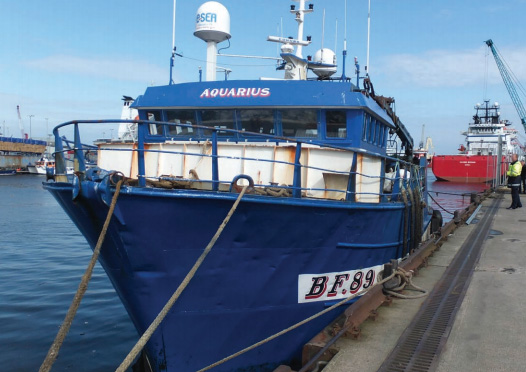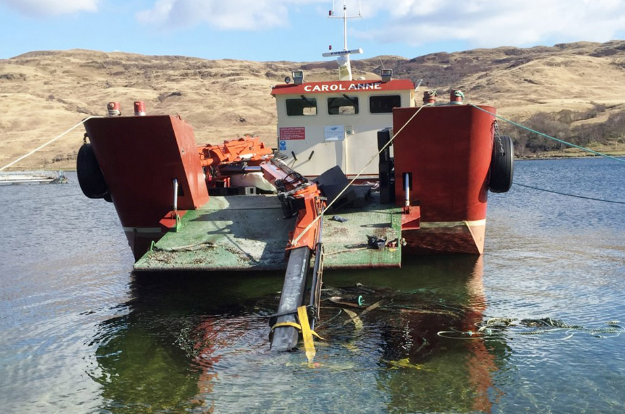The Marine Accident Investigation Branch has found that "unnecessarily hazardous working practices" and "multiple safety related deficiencies" on the Aquarius led to the fisherman's death.
An investigation has revealed that the twin rig trawler, Aquarius was “a poorly run vessel”, issued with 137 deficiencies in the years prior to the death of Nuertey Annang.
The Ghanaian-born fisherman, who was 47, died on 17 August 2015 when a rope stopper parted and he was thrown “violently” overboard.
The vessel was around two miles east of Aberdeen harbour in Scotland when the incident happened.
Despite searches, Annang’s body was never found.
A report by the Marine Accident Investigation Branch (MAIB) identifies that “The skipper and owners of Aquarius consistently prioritised the catching of fish over the safety of the vessel and its crew. This resulted in the promotion of a poor safety culture.”
It found that the crew, nor their vessel “had been adequately prepared to deal with such emergency situations.”
“When the crew raised the alarm the skipper’s initial reaction was to focus on monitoring Annang’s position in the water, and manoeuvring Aquarius astern towards him. The crew threw lifebuoys towards their crew mate in the water and shouted encouragement, but despite these efforts Annang soon succumbed and sank below the surface of the water,” said the report.
“About 15 minutes after the casualty entered the water, and having realised that the attempts to rescue him had failed, the skipper used his mobile phone to alert Aberdeen VTS.”
This, said the MAIB, “fell well short of recognised good practice” when dealing with a man overboard.
Aquarius was also not carrying all the life saving equipment required for a fishing boat of its size, and “the majority of the safety equipment it did carry was not being properly maintained.”
It did not carry a dedicated means of recovering a person from the water, or a sufficient number of lifejackets for all on board; one of the liferafts had not been properly rigged; access to one of the lifebuoys had been obstructed; and the distress flares and first-aid supplies were out of date.
Although the crew of the Aquarius were all experienced fishermen who had completed the UK’s mandated sea survival and safety awareness courses, “the vessel’s man overboard procedure contained little or no detail on the fundamental steps to take in such an emergency situation,” said the MAIB.
The crew also did not conduct regular emergency drills.
“It was clear that Aquarius and its crew had not been properly prepared to deal with the situation. Had the vessel been adequately equipped, its safety equipment properly maintained, and its crew regularly drilled, Annang’s chances of survival would have been increased considerably,” concluded the MAIB.
It also found that there was no enforcement for the men to wear Personal Flotation Devices (PDFs), and Annang had not been wearing one when he went overboard.
The MAIB also highlighted that crew members on board Aquarius were “not afforded the minimum standards required by UK legislation” when it came to working time regulations.
Crew often worked in excess of 48 hours per week, they did not receive 4 weeks’ annual leave or compensatory leave; and they did not get a 6-hour rest period during the 24 hours leading up to the accident.
“The Ghanaian crew members’ contracts of employment, issued by a UK manning agency, made no reference to the fishermen’s working time regulations, and did not include maximum hours of work, or annual and compensatory leave entitlements,” said the report.
“The vessel’s British skippers took regular 10-day breaks, but the foreign nationals were expected to work and live on board Aquarius without any opportunity to take periods of compensatory leave.”
The Maritime and Coastguard Agency had surveyed and inspected Aquarius on numerous occasions during the previous nine years.
It had identified Aquarius as “a poorly run vessel and issued it with 137 deficiencies; many of these related to safety management and were of a repetitive nature,” found MAIB inspectors.
An inspection of the Aquarius after the fatal accident found “so many safety-critical deficiencies”, the the Maritime and Coastguard Agency surveyor suspended the inspection and detained the trawler.
“The underlying factors that contributed to this accident included: a total lack of proactive safety management; a poor level of onboard safety culture; and the crew suffering from tiredness and fatigue,” concluded the MAIB.
Recommendations have now been made to the owners of Aquarius, the vessel’s manning agency and the Maritime and Coastguard Agency.
These are aimed at improving the levels of safety management and emergency preparedness on board Aquarius; the working
conditions and hours of rest for non-UK nationals on board UK flagged fishing vessels; and the capability of the electronic systems used by the Maritime and Coastguard Agency to manage and monitor deficiencies and poor performing fishing vessels.
In a statement, the Chief Inspector of Marine Accidents, Steve Clinch, said the accident was “a stark reminder of the hazards faced by fishermen at sea”.
“This is yet another tragic example of a crew member losing his life after going overboard from a fishing vessel. The crewman did not wear a PFD when working on the open deck and his crewmates were not able to recover him before he was lost to the sea,” he noted.
“The MAIB investigation found that unnecessarily hazardous working practices on Aquarius were considered to be the acceptable norm by everyone, including the owners and skippers of the boat,” continued the Chief Inspector.
“Aquarius had been issued with multiple safety related deficiencies by the Maritime and Coastguard Agency prior to the accident, however these appeared to have made little difference to how the boat was operated,” he said.
“This accident is a stark reminder of the hazards faced by fishermen at sea, but also how fishermen can reduce those hazards by giving more thought to the foreseeable risks they face on a daily basis and take positive action to reduce the likelihood of accidents occurring,” stated Clinch.
“In this way, relatively simple changes to the way fishermen work will help to ensure that they come home to their family safely,” he added.
Interim MAIB report: Clipper sailor, Andrew Ashman died as a result of an accidental gybe
Paramedic Andrew Ashman was the first fatality in the history of the Clipper Round the World Race. An interim MAIB…
MAIB: boaters should fit carbon monoxide alarms
The Marine Accident Investigation Branch has issued a stark warning to boaters following the deaths of two people on board…
MAIB: Death of skipper of the Carol Anne was avoidable
Jamie Kerr, 25, died on the Carol Anne when the crane fitted to the workboat collapsed. The MAIB has now…






